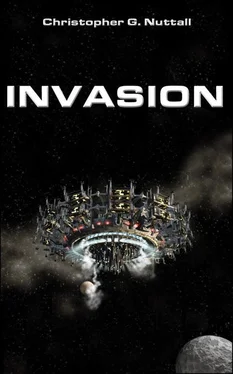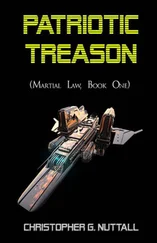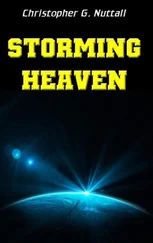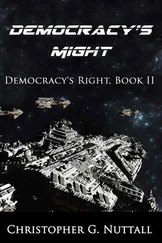Femala, despite herself, started to explain. She talked about the four sects that made up the Truth and the Truthfulness, and about the clans that made up each of the sects. She spoke about how the clans saw to it that each of the children was raised to know his or her place and how they wanted, more than anything else, to increase their own numbers. As a sterile women — not even a male who could be expended in war — she’d been sentenced to death by her clan, until the High Priest had saved her.
“Why?” Paul asked. The human really didn’t understand. How did humans handle such problems among their people? “Did he… want your body?”
It took several rounds of explanations before Femala understood what he meant. “No,” she admitted. The very thought showed how aliens the humans were. The idea of someone selling their sexual services was strange. “As a sterile woman, I don’t have the… scent to draw in the males and convince them to protect me and compete for my favours.”
The human seemed puzzled, but passed on the issue. “What do you think of this place?”
“Boring,” Femala said, truthfully. It was true that they’d brought her books to read — human books, sometimes interesting ones — but it was very confining when she could have been running through the fields of Earth, or examining more of their technology in the occupied zone. “What are you doing to do to me?”
The human ignored the question. “Why are your males just… waiting for something?”
Femala almost laughed. “They expect you to kill them, of course,” she said. It had been a trait of warfare since before the Unification Wars. Females could bear new children for the victors, but the males were useless. “They’re warriors who fell into enemy hands, so of course you’re going to kill them, or enslave them. What are you going to do with them?”
“I don’t know,” Paul admitted. It sounded as if he didn’t really care, although it was hard to read the human voice. If the other female had been able to share her insights… but that was air out the airlock now. “That’s a question for my superiors.”
“You should tell them to surrender and accept the Truth,” Femala said. She pushed as much earnestness into her tone as she could, although she suspected that the human wouldn’t recognise it as such. “It’s the only way to stop the fighting.”
Paul leaned closer. The eerie human eyes peered into her own eyes. “Is there nothing else we can offer you?”
Femala sighed. “The Truth has endured for thousands of cycles,” she said, almost sadly. It had been the Truth that had condemned her to death for being sterile. “It cannot be broken. Your world will break before the High Priest chooses to leave you to your unbelief.”
We must respect the other fellow’s religion, but only in the sense and to the extent that we respect his theory that his wife is beautiful and his children smart.
— H. L. Mencken
“And you may rise.”
Joshua Bourjaily rose to his feet, his joints creaking, as the alien priest blessed them and shoed them out of the converted warehouse. The alien religion, Joshua had discovered, required plenty of forward kneeling, a pose that the aliens could hold almost indefinitely, but humans couldn’t hold for long. It was worse for the women; when they knelt, their hands held behind their heads, they pushed their breasts forward into prominence. After a pair of incidents, the aliens had apparently broken one of their own taboos and segregated the sexes for prayer meetings, even though they seemed to worship together. It was hard to tell; they’d seen very few alien females on the streets and they’d never seen the aliens in solo prayer.
He glanced towards the alien priest, thinking dark thoughts that he was careful to keep to himself. A couple of people — an old woman and a young black man — had attempted to challenge the aliens, praying out loud in their own style, only to be mercilessly gunned down. The aliens had regarded it with the same level as horror as most Americans would regard taking a dump on the American flag… and similar incidents had been nipped in the bud. The aliens, it seemed, weren’t taking too many chances with their prayers and their flock.
The priest, wearing a simple brown robe, nodded once to him as he left the warehouse. The alien religion was still a thing of mystery, despite the lessons; they were literally teaching him the prayers without bothering to explain the meaning. The only choice he’d had had been a question about which element — fire, water, air or earth — he favoured, a question he’d answered with ‘earth,’ trying to be clever. The aliens hadn’t even noticed; they’d merely ordered him and his fellow ‘earthers’ to report to a certain warehouse, every second day, or see their food supply cut off. Now that the aliens were feeding more of the population, somehow, it was a powerful incentive. A person without a valid feeding card, marked by one of the priest’s servants, simply wouldn’t be fed.
He looked at the card as he waited in line for the mark. It wasn’t alien technology, he was sure; they wouldn’t have bothered to bring that level of tech from their homeworld. It was human tech, a simple ID card with a picture, a brief level of detail… and a microchip mounted in the plastic that did whatever the aliens told it to do. He was pretty sure that what was really happening was that the aliens were building up a picture of who went where, and why, in their search for other insurgents. Austin might have been fairly quiet over the last couple of weeks, but there had been a handful of IEDs, several of which had killed alien collaborators. The insurgents were still out there, somewhere, but doing what? Joshua hoped that they were plotting new attacks on the aliens, but ever since the attack on Texas had failed, the population was starting to realise, in the cities at least, that insurgency was only going to get a few thousand more people killed.
It was a different story, he’d been told, out in the countryside; the Internet had been buzzing with stories of mounted Texans fighting the aliens. Joshua had dismissed at least half of that story as exaggeration, but Texas had literally tens of thousands of people who could handle guns and horses… and there might be a nugget of truth in there somewhere. The cities, however, were falling further and further under the alien control… and even those who hated the aliens had to eat, somehow.
“May God be with you,” the alien under-priest said, as he passed Joshua’s card through a scanner. To be fair to the aliens, they didn’t dally about like a drug-supplier lording it over a dependent flock, they just handed over the card with a benediction. “Eat well and give thanks.”
Joshua walked onto the streets and around the building. The women — which basically seemed to mean every woman over ten years old — were emerging from the other side of the massive building. The warehouse was nowhere near large enough to hold all of the citizens of Austin — although everyone knew someone who’d been killed in one of the bouts of fighting — and he’d heard that there were dozens of such places, all around the city. The aliens didn’t mess around… and he’d heard rumours that children — defined as anyone under ten years old — were being taken for special instruction. The Adair children, thankfully, were too old… but there were hundreds of others. No one seemed quite sure what the aliens were teaching them, but Joshua had determined to get to the bottom of it. Blogging from an occupied city was rapidly starting to lose its shine.
“Joshua,” a voice called. He looked up to see Loretta running towards him. He’d met her by sheer accident, a girl who actually had better computer skills than he had — which wouldn’t have been difficult — and was willing to assist him in navigating the remains of the internet. “How was your day?”
Читать дальше












